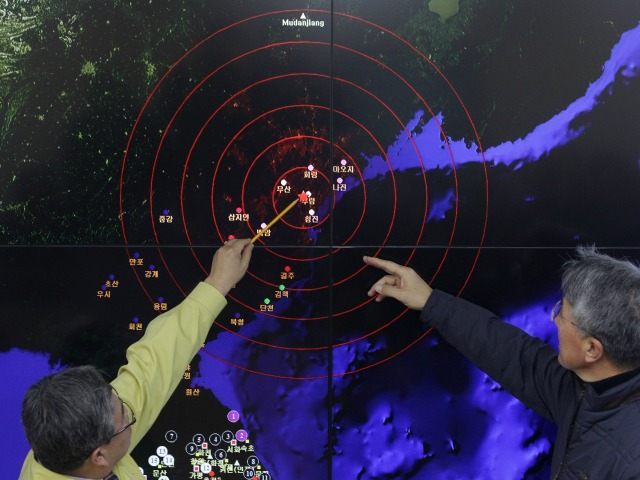North Korea claims to have detonated a hydrogen bomb – as they described it, an “H-bomb of justice” – that would represent a massive escalation in the Communist dictatorship’s nuclear capability, putting them one major step closer to having weapons that can hit the continental United States.
While something clearly exploded in North Korea, there are reasons to doubt it was a successful H-bomb test.
The most obvious evidence to the contrary is that the tremors from the explosion were measured at 5.1 on the Richter scale, which is exactly the same reading produced by a 2013 North Korean A-bomb test. A hydrogen bomb blast should be far more powerful.
Such was the judgment of South Korean intelligence, according to the Associated Press: “A South Korean lawmaker said the country’s spy agency told him in a private briefing that Pyongyang may not have conducted an H-bomb test given the relatively small size of the seismic wave reported.”
The AP goes on to quote South Korean sources saying their measurements of the detonation made it out to be slightly smaller than the 2013 North Korean test, which they logged at 4.9 on the Richter scale, implying an explosive yield of 7.9 kilotons. Even an unsuccessful H-bomb test –an essentially valid design which failed to achieve nuclear fusion – would have a far greater explosive yield.
The small explosive yield could be explained by North Korea testing an extraordinarily advanced miniaturized H-bomb, the sort of technology only America and Russia are currently thought to possess.
Hanyang University professor of nuclear engineering Jaiki Lee also suggested North Korea might have been testing a hybrid bomb using both fusion and fission fuels – basically a shot of atomic bomb with an H-bomb chaser.
The New York Times reports several South Korean government and media sources leaning towards the “boosted-fission” hypothesis. The presence of any fissionable material in such a boosted device would be more than enough for the North Korean regime to claim it had detonated an H-bomb. Pyongyang has made such exaggerated claims in the past, with far less evidence to back them up.
“Given the scale, it is hard to believe this is a real hydrogen bomb,” Korea Defense and Security Forum senior fellow Yang Uk told Reuters. “They could have tested some middle stage kind (of device) between an A-bomb and H-bomb, but unless they come up with any clear evidence, it is difficult to trust their claim.”
CNN observes that the elapsed time since the last North Korean nuclear test, the expertise available to the rogue state, and the amount of resources dedicated to the project make it unlikely that it could reach fusion bomb potential so quickly, without help from outside experts.
“North Korea is not as broadly developed as, let’s say, India,” explained Paris-based analyst Francois Heisbourg to NBC News. “It does not appear that they have the ability to do a fully-fledged H-bomb because you need a much more broadly-based industrial capability and technical capability than the one North Korea currently has.” He went on to note that it required dozens of tests before American engineers learned how to mount a true hydrogen bomb on a long-range missile.
The AP notes that North Korea’s secretive underground testing protocols make it difficult to judge the nature of the explosion by looking for radiation traces.
CNN notes that dictator Kim Jong Un has many reasons to fake a successful H-bomb test, including the need to stimulate national pride among the North Korean population, demonstrate his power to both internal and international audiences, make adversaries such as the United States more nervous about contemplating military action against him, and make the international community nervous as a prelude to yet another shakedown. Kim also has a tendency to rattle his saber when he thinks the world’s attention has been focused on other global supervillains, such as the Islamic State, for too long.
Kim’s domestic audience seems to have gotten the message, as the Associated Press reports “an expected rush of nationalistic pride” in Pyongyang, expressed through man-on-the-street comments such as “Since we have [an H-bomb], the U.S. will not attack us,” and “If we didn’t have powerful nuclear weapons, we would already have been turned into the slaves of the U.S.”

COMMENTS
Please let us know if you're having issues with commenting.